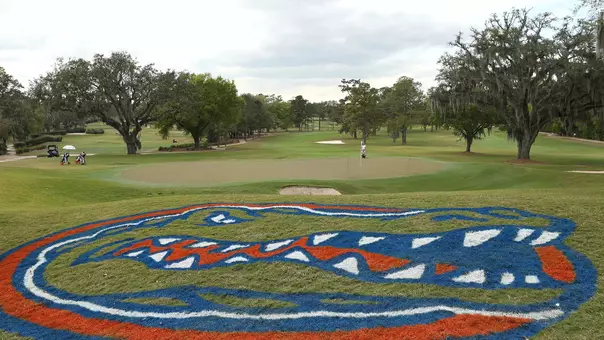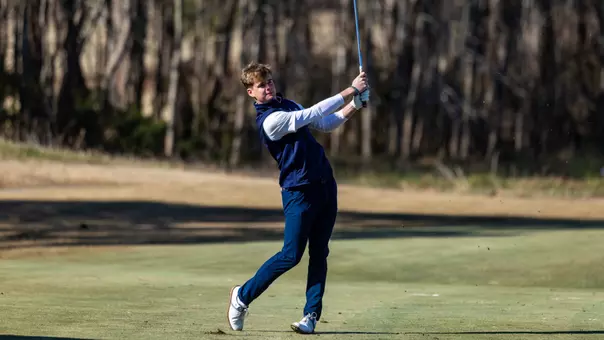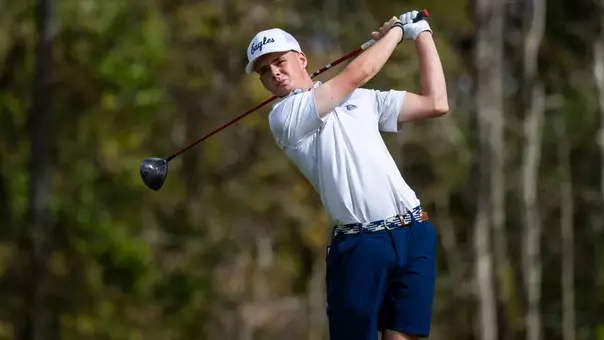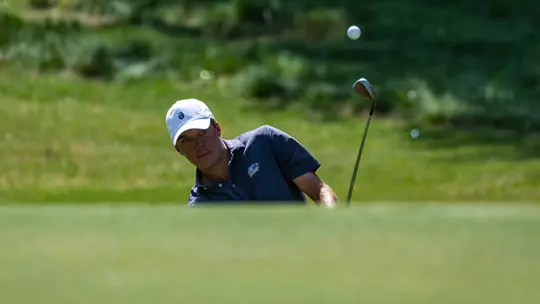
MGOLF Feature: School Always in Session for Wilson Andress
The Georgia Southern grad plays in the final stage of U.S. Open qualifying Monday.
Marc Gignac
6/3/2023
STATESBORO – Forgive Wilson Andress if it takes him a second or two to remember the last time he made a B in school.
“I think it was sophomore year of high school,” he says as if trying to recall the name of a one-time acquaintance from years past.
Then it clicks.
“AP European history,” he adds confidently. “That teacher was pretty tough. It was like an 89 – pretty close. It wasn’t looking too good, but I did pretty well on the final exam.”
It has been all As for Andress since then, including all five years at Georgia Southern while playing golf for the Eagles, and he graduated in May with a 4.0 grade point average in civil engineering. The list of academic accolades is lengthy and still growing - a two-time Golf Coaches Association of America All-American Scholar, named to the President's List (4.0 GPA) in all 10 semesters at Georgia Southern, Sun Belt Commissioner's List for four consecutive years and most recently, College Sports Communicators Academic All-District.
Academic success, especially any subjects requiring arithmetic, has always been an area of strength for Andress. It runs in the family. His grandmother was a math teacher, and one of his father’s favorite things to say is that English is his second language behind numbers.
“Math has always come pretty easy to me for the most part, and I enjoy it too,” he admits. “It always helps if you enjoy something; it makes it a lot easier to learn it.”
Andress spent much of his youth playing baseball until golf really caught his eye at the age of 12. He and a friend started playing golf before baseball practice for an all-star team each day, and he got hooked on the sport.
"It just seemed to be a lot more fun than baseball,” remembers Andress. “It was something new every day. Golf is a new course, a different shot, something different every time. With baseball, you're catching a grounder, throwing a pitch, and it just kind of got boring and I got burned out. I had played golf since I could walk but didn’t really practice or take it serious until then.”
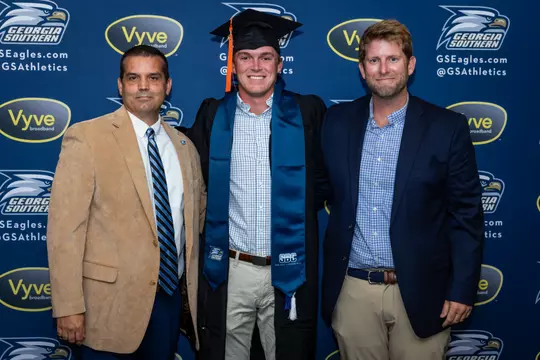
Andress turned the bulk of his attention to golf but found himself to be a little late to the party in the world of junior golf. He was playing in tournaments against kids who had a six-year head start.
“You had kids who had been playing junior tournaments since they were in first grade, so they're shooting under par, and I was trying to break 100 and when I did break 100, I was pretty happy,” recalls Andress.
Instead of getting angry or down on himself, Andress used those experiences as opportunities to learn from them.
“I saw what they did, and learned from that and worked harder,” says Andress. “When you play someone that's better than you, I think that's one of the big things is just learning from them and seeing what they do differently and what makes them better than you. When I play someone who I see is ranked highly, I always take a glance when they're warming up kind of what they do, what they do on the course, what's different about their game that puts them ahead of me. You can always learn from others.”
A native of Macon, Georgia, Andress spent a lot of time at Idle Hour Country Club, his home course, honing his craft. Matthew Beringer, who was three years older and would go on to play college golf at Georgia from 2016-18, took Andress under his wing.
“Matthew was somebody I looked up to a lot,” says Andress. “I was very small until about senior year of high school, so I didn't hit it very far. He showed me how important short game was, taught me everything about chipping and putting and all that - basically everything inside of 100 yards.”
The tutelage and diligence began to pay off the summer following Andress’ sophomore year in high school, and Georgia Southern coach Carter Collins took notice. He was impressed most by the intangibles.
“I saw passion, competitiveness, determination and work ethic,” recalls Collins. “He plays the game with a lot of fire and wears his competitiveness on his sleeve and for a junior golfer, he really stood out as somebody who was going to find a way to beat people anyway he can.”
Collins also took notice of the short game, specifically the putter.
“The ball striking wasn’t clean for him so he had to be good with the putter to survive,” said Collins. “He had to make a lot of long putts for par and difficult putts for birdie, but being a scrapper and having to make those putts just to stay in the game was huge for him because he built a lot of confidence in his putting through that. When his ball striking caught up, he took off.”
A ninth-place finish at the AJGA Kansas Junior and an eighth-place showing at the GSGA State Junior Championship in Athens brought the interest from colleges and solidified the fact that the opportunity to play college golf was going to be a reality. Though Andress’ academic record offered him a host of college options, playing college golf had become a priority. When the offer to play at Georgia Southern came from Collins, he grabbed it.

Andress played in the lineup in nine of 13 events as a freshman and followed his mantra of learning from others, specifically Steven Fisk, a senior at the time who would go on to finish runner-up at the NCAA Championship. Fisk won four of the five tournaments that fall and as Andress put it, “gave us a wake-up call on how hard we had to work and what it took to be that good.” For Andress, the lesson was in course management.
“At first, I thought my course management was good, but as you play harder courses in college, it kind of gets exposed more than in junior golf,” says Wilson. “He taught me a lot about strategy around courses, which helped a lot. At first, I was a little stubborn, didn't really take it too serious, but now I've bought in completely, and it's a lot more fun. I didn't realize exactly how much he'd bought into it, and he kind of showed me how to do it.”
Andress hit a rough patch his sophomore year and played in the lineup in five of 18 events the next two seasons. As with most golfers, a couple bad rounds led to tinkering, followed by overthinking, and things begin to unravel from there.
“I think it starts out, you just aren't playing great, and then you kind of start trying to make it other things,” says Andress. “You think it's your swing, and you start getting into that and you get kind of down a rabbit hole searching.”
The rally began at the end of his junior year. He had worked with another swing instructor for about a year at that point, and things started to click.
"I finally was getting down what we were working on,” he says. “Eventually, I got to a point where I just quit worrying about my swing as much, and that's kind of what turned it around.”
Andress made the lineup for the fist event of his senior year, the Gopher Invitational, shot 2-over, finished T25 and never looked back. Four top-20s and a T5 at the Sun Belt Championship earned him third-team All-Sun Belt honors in 2021-22. A win at that same Gopher Invitational last fall was one of three top-10 outings en route to first-team all-league honors in 2022-23. He capped his career by leading the Eagles with a T14 at the NCAA Salem Regional in May.
“Wilson and his swing coach did a lot of great work building a more repeatable swing that he could use competitively so when the pressure got higher, his golf swing stood up to that,” said Collins. “It was just a matter of giving him more chances for birdie on the greens, and when his golf swing started giving him more chances, he took off from there.”
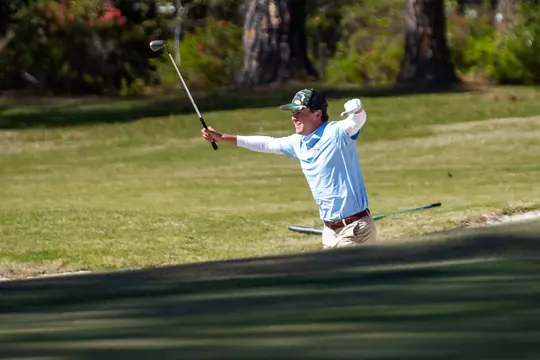
Andress has excelled outside the college ranks this year as well. He took medalist honors at the U.S. Open Gainesville Local Qualifier and is one step away from earning a spot in the 123rd playing of U.S. Open. That test comes Monday, June 5, in a Final Qualifier at Hawks Ridge Golf Club in Ball Ground, Georgia. It will feature 36 holes in a field of 45 and is one of 13 U.S. Open Final Qualifiers around the world.
“It's the top amateurs in the Southeast and then a bunch of pros too,” says Andress. “There's probably five or six guys that have won PGA tour events that are in it, so the field is very strong. It’s 36 holes in one day, anything can happen, just hopefully get off to a good start and keep it rolling.”
Andress earned conditional status on PGA Tour Canada by finishing T11 at a PGA Tour Canada Qualifying Tournament at the Club at Weston Hills in Florida in February. Eagle teammate, classmate and former roommate Ben Carr finished sixth to earn status, and the duo are slated to begin their professional golf careers June 15 at the Royal Beach Victoria Open in Victoria, British Columbia.
"We're splitting a bunch of hotels and rental cars and booking the same flights while we're up there so we'll be traveling a lot together while we're there,” says Andress. “It's about as far away from home as I've ever been so it's going to be nice to have someone I've lived with for five years there.”
In most of professional golf, there are no unions, no guaranteed salaries. You pay your own freight in terms of travel, medical and whatever other expenses arise. You play your way into opportunities, find a way to gain experience, learn from your failures and move on. Nothing is given to you; it is all earned.
There seems to be two schools of thought among those chasing dreams in similar industries. Some go into it with a back-up plan and a time limit – give it three years and then take over the family business. Others want nothing to do with that safety net because they feel it holds them back – it’s all or nothing. With a college degree and an impressive academic record, Andress has the best of both worlds.
“I don’t have a plan B right now, but I know I can get a job if I need one,” he says. “Some of these guys are playing knowing that they have to live off these paychecks, and I’m definitely not going to be a lifer on the mini tour. I feel like I'm slowly getting better and better every year, so I’ll keep going until I get to the point where I feel like I've leveled off and I’m not really getting any better. At that point, Mid-Am golf sounds pretty fun too.”


